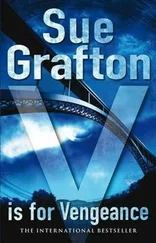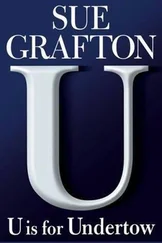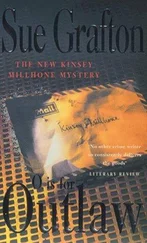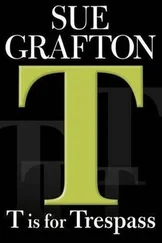Henry's house was dark by the time I got home. There were no messages on my machine. As a way of unwinding, I tidied up the living room and scrubbed the downstairs bath. Cleaning house is therapeutic-all those right-brain activities, dusting and vacuuming, washing dishes, changing sheets. I've come up with many a personal insight with a toilet brush in hand, watching the Comet swirl around in the bowl. Tomorrow night I'd dust my way up the spiral staircase, then tackle the loft and the upstairs bathroom.
I slept well, got up at 6:00 a.m., and did my usual run, whizzing through my morning routine on automatic pilot. On my way into the office, I stopped off at the bakery and bought a huge Styrofoam container of caffé latte with a lid. I had to park my car two blocks away, and by the time I got to my desk the coffee was the perfect drinking temperature. While I sipped, I sat and stared at the file folders strewn across every available surface. I was going to have to straighten things up just to figure out what was what. I drained half the coffee and set the cup aside.
I pushed my sleeves up and went to work, getting organized. I emptied both boxes, plus the brown grocery bag full of files I'd picked up at Morley's house, adding in the few additional files from his office. I rearranged the piles alphabetically and then painstakingly reconstructed the sequence of reports, using Morley's invoices as a master index. In some instances (Rhe Parsons being a case in point), I had a name itemized on his bill without a file to match. For "Francesca V.," whom I took to be the current Mrs. Voigt, I found a file folder neatly labeled, but there was no report in it. The same was also true of a Laura Barney, who I assumed was David's ex-wife. Had Morley talked to them or not? The former Mrs. Barney apparently worked at the Santa Teresa Medical Clinic in some capacity. Morley'd noted a telephone number, but there was no way to tell if he'd gotten through to her. He'd been paid for sixty hours' worth of interviews, in some cases with accompanying travel receipts, but the corresponding paperwork didn't add up to much. I made a penciled notation of any name without attendant notes or a written report.
By 10:30, I had a list of seventeen names. Just as a spot check, I tried two. First, I placed a call to Francesca, who answered after one ring, sounding cool and distant.
I identified myself and verified, first of all, that she was married to Kenneth Voigt. "I'm reorganizing some files and I wondered if you remember what date you talked to Morley Shine."
"I never talked to him."
"Not at all?"
"I'm afraid not. He called and left a message about three weeks ago. I returned his call and we agreed to meet, but then he canceled for some reason. As a matter of fact, I asked Kenneth about it just last night. It seemed odd somehow. Since I testified at the first trial, I assumed I'd be called the second time around."
I glanced down at Morley's memo, which seemed to indicate they'd had a meeting. "We better set up an appointment as soon as possible."
"Hang on a minute and I'll get my book." She put the phone down on her end and I heard the tap of heels across hardwood. She returned to the telephone with a rustle of paper. "I'm busy this afternoon. What's this evening look like for you?"
"That sounds fine to me. What time?"
"Could we make it seven? Kenneth usually doesn't get home until nine, but I'm assuming you don't need him to sit in."
"Actually, I'd prefer to have the time alone."
"Good. Then I'll see you at seven."
I tried the clinic next and found myself connected with what I guessed was the reception desk. The person who answered was female and sounded young.
"Santa Teresa Medical Clinic, this is Ursa. May I help you?"
I said, "Can you tell me if you have a Laura Barney working at the clinic?"
"Mrs. Barney? Sure. Hang on and I'll get her."
I was placed on hold briefly.
"This is Mrs. Barney."
I introduced myself, explaining, as I had with Francesca, who I was and why I was calling. "Can you tell me if you talked to Morley Shine in the last couple of weeks?"
"As a matter of fact, I had an appointment with him last Saturday, but he never showed up. I was very annoyed because I'd canceled some plans in order to make time for him."
"Did he give you any indication what he meant to ask?"
"Not really, but I assumed it was in conjunction with this lawsuit coming up. I was married to the man acquitted of the criminal charges."
"David Barney."
"That's right. We were married for three years."
"I'd like to talk to you. Can we set up a time this week?" In the background, I could hear another line begin to ring insistently.
"I'm usually here until five. If you stop by tomorrow I can probably make some time."
"Four-thirty or five?"
"Either one is fine."
"Good. I'll stop by as close to four-thirty as I can make it. I'll let you pick up your other call."
She said thanks and clicked off.
I went back to my list and called nine other names at random. Not one of them had ever heard from Morley Shine. This was not looking good. I buzzed Ida Ruth in the outer office. "Is Lonnie still in court?"
"As far as I know."
"What time's he get back?"
"Lunchtime, he said, but he sometimes skips lunch and heads for the law library instead. Why, what's up? You want to get a message to him?"
A low-level dread had begun to churn in my chest. "I better go over there and have a chat with him myself. Which courtroom, did he say?"
"Judge Whitty, Department Five. What's going on, Kinsey? You sound very strange."
"I'll tell you later. I don't want to commit myself quite yet."
I walked over to the courthouse, which was only two blocks away. The day was sunny and clear, with a mild breeze ruffling the grass on the courthouse lawn. The architecture of the building itself is Mediterranean, complete with towers, turrets, sandstone arches, and open-air galleries. The exterior landscaping is a bright mix of magenta bougainvillea, red bottlebrush, junipers, and imported palms. A low growing fringe of ground cover along the sidewalk threw out a heady perfume.
I went up the wide concrete steps, through ornate wooden doors. The corridor was empty. The floor was paved with glossy irregular stone tiles the color of old blood. The lofty ceilings were hand-stenciled and crisscrossed with dark beams. The lighting fixtures were wrought-iron replicas of Spanish lanterns, the windows secured by sturdy grillwork. The place might have been a monastery once; all cold surfaces, stripped of ornament. As I passed, the door to the jury assembly room opened and prospective jurors poured out into the hallway, filling the air with the tap-tapping of footsteps and the murmur of voices. Soon I could hear the incessant squeaking of stall doors in the rest rooms across the hall. Department 5 was located another two doors down the hall on the right, the lighted sign above the door indicating that court was still in session. I eased the door open and slipped into a seat in the rear.
Lonnie and opposing counsel were involved in a case management conference, their voices droning on the warm air like big fat bumblebees. The judge was in the process of referring the case to judicial arbitration, setting the dates for both the completion of the arbitration and a future case management conference. As usual, I wondered how individual fates could be decided through a process that sounded, on the face of it, so dull. When the judge broke for lunch, I waited by the door, catching Lonnie's eye as he turned and headed through the little swinging gate that separated the spectators' 'pews' from the court. He took one look at my face and said, "What's the matter?"
"Let's go outside where it's private. You're not going to like this."
Читать дальше











